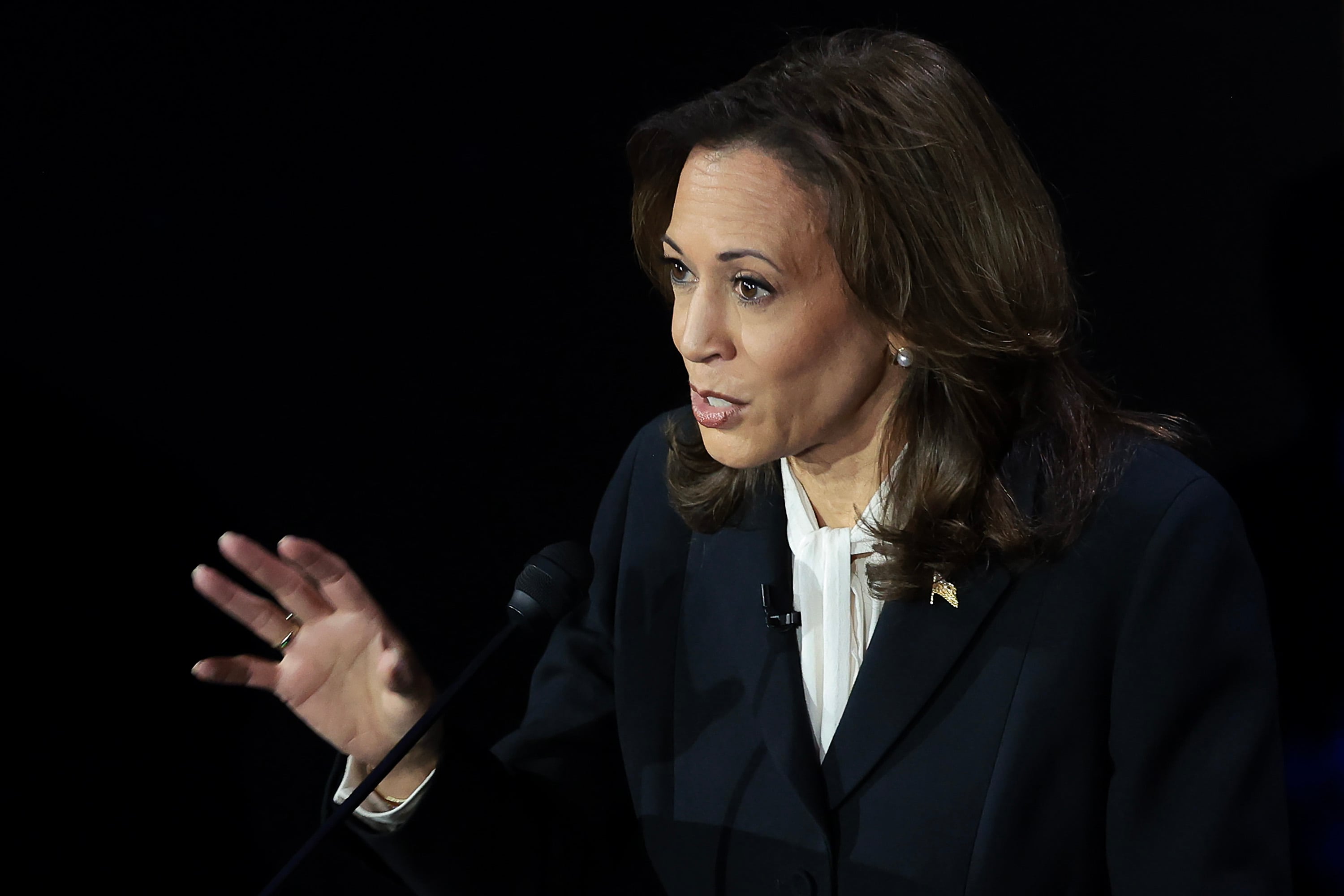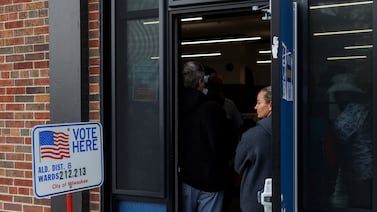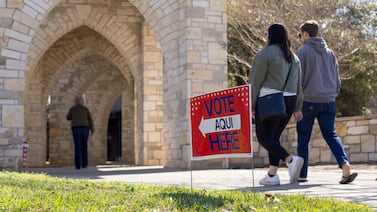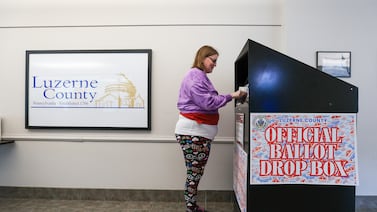Votebeat is a nonprofit news organization reporting on voting access and election administration across the U.S. Sign up for Votebeat Pennsylvania’s free newsletter here.
Despite a bump following Joe Biden’s exit from the presidential race, Democrats in Pennsylvania are entering the home stretch of the 2024 election with their weakest voter registration advantage compared with Republicans in recent decades.
The party’s raw registration numbers began to rise after Biden dropped out in late July, and that trend is continuing. But simultaneously, the number of Republicans has increased even more quickly.
In other words, Democrats’ overall share of voters is still declining, and recent increases haven’t made up for losses over the past four years.
The Pennsylvania Department of State makes available voter registration data as far back as 1998. In those 26 years, Democrats have never had as small an advantage as they do now.
As of Sept. 16, Democrats made up 44% of registered voters in the commonwealth, down from a 2009 high of 51.2%, while Republicans were at 40.2%, up from 36.9% in 2009. Unaffiliated and third-party voters have boosted their numbers even more, from 11.9% in 2009 to 15.7%.
Republican activists argue their party’s rising voter registrant share proves Donald Trump can once again pull off a Pennsylvania victory. Democrats, meanwhile, say they’ve seen promising trends since Vice President Kamala Harris entered the race, despite their party’s still-declining share of registered voters.
Both parties are holding registration drives ahead of Pennsylvania’s Oct. 21 deadline but they are also focused on another key driver of votes: encouraging turnout among those already registered. Democrats in particular have expressed concern that without strong turnout in vote-rich Philadelphia, they can’t win the state.
Experts agree that voter registration is an imperfect measure of political engagement. Lara Putnam, a historian at the University of Pittsburgh who studies election data, calls registration “noisy” because it is affected by factors far beyond current voter engagement and enthusiasm.
For instance, she said, a big reason why Democrats are currently seeing registration losses is the correction from two enormous past bumps.
One was about 60 years ago, at “the height of the labor-led, industrial, immediate post-New Deal prosperity in Pennsylvania, where being a good union member, being a good community member in so many parts of the state meant registering as a Democrat,” Putnam said. Another came before and during the Obama administration, when engagement among traditionally low-turnout voters spiked.
That first cohort, Putnam said, largely stayed registered as Democrats, even if they didn’t keep voting that way. Now, deaths in that generation are reducing their numbers. Similarly, the Obama-era voters are now waning because many were young and have moved, and others have become inactive and are being cleaned from the voter rolls.
These two trends form a perfect storm for Democratic registration to dip, but don’t necessarily mean actual voting behavior is changing as much as the numbers suggest. Putnam describes the shifts as more of a “hangover” from past engagement patterns.
With Pennsylvania’s Oct. 21 registration deadline fast approaching, Republicans have nearly 40,000 more voters than they had in November 2020. Democrats, on the other hand, are roughly 303,000 voters behind their 2020 status.
The push to win Pennsylvania voters
In election seasons, a slew of registration and get-out-the-vote operations spring up in swing states. Some focus on enrollment. Others center engagement. All are trying to respond to a complicated mix of political data: registration trends, issue polling, voting history, census information, and much more.
Registration has been a particular focus for Early Vote Action, a national GOP operation. The group is run by Scott Presler, a longtime conservative activist with far-right ties.
In 2017, he organized nationwide rallies with the group ACT for America, which criticizes Islam. The group’s founder once reportedly said that an observant Muslim “cannot be a loyal citizen of the United States,” and the rallies Presler organized attracted support from white supremacists. Presler was also involved in Trump’s efforts to overturn the 2020 election results, holding “stop the steal” rallies and calling the Jan. 6 attack on the U.S. Capitol “the largest civil rights protest in American history.”
But Presler has lately focused his efforts — and his national profile — on voter registration, particularly in Pennsylvania. He regularly posts updates on the number of voters he claims his organization has registered.
Early Vote Action has contractors across the state who set up voter registration tables and other outreach efforts. Using an app, the contractors also instruct volunteers on how to target key voters by sending postcards and texts, door knocking, and making phone calls.
Jondavid Longo, Early Vote Action’s Pennsylvania director, said the group sometimes runs into difficulties getting voters to trust the election process or agree to vote by mail, after years of GOP claims that the system is broken or rigged. But he’s also convinced that strong Republican numbers aren’t just due to regular registration tides, but are a true expression of sentiment.
“It’s obvious to everyone that Republican voter registration efforts, and registration efforts in general, are leaning in favor of the Republican Party,” said Longo, who is also the mayor of the Western Pennsylvania borough Slippery Rock, a Butler County GOP committee member, and a community college professor.
“In almost every county, consistently, for almost an entire year, since January, Republicans have outperformed Democrats in voter registration numbers nearly every month or and in nearly every county,” Longo said.
But registration isn’t the only factor the parties care about.
Activists and candidates for both parties are also laser-focused on making sure as many eligible voters as possible cast ballots.
At a recent outreach event hosted by the South Philly Voter Project, led by progressive state Rep. Elizabeth Fiedler and Sen. Nikil Saval, volunteer door knockers emphasized turnout.
Philadelphia is dominated by Democrats. The city has so few registered Republicans that in local elections, Democratic primaries almost always determine the outcomes of races. This makes the city and its surrounding suburbs crucial sources of votes for the Democratic Party — but it also means that low turnout can be devastating.
That’s a real concern this year because, in both the 2020 and 2022 elections, Philadelphia turnout has been markedly lower than average turnout statewide.
In its door-knocking session, South Philly Voter Project targeted Democratic, unaffiliated, and third-party voters, who data showed did not consistently cast ballots. The idea, according to coordinator Tamesh Kemraj, is to bolster support as much as popular in dense areas like South Philly using deep canvassing — time-intensive conversations aimed at convincing people to vote.
“We do effective voter outreach by having our neighbors knocking on their neighbors’ doors,” said Kemraj, who is also a city committee person and works on Fiedler’s campaigns. “It’s not someone they haven’t seen before, but someone next door who’s saying, ‘Hey, I’m a neighbor knocking on your door, letting you know why this is important to us.’”
New voters are ‘up for grabs’
Putnam, the University of Pittsburgh historian, said there are indeed some genuinely good signs in the registration data for Republicans and bad ones for Democrats.
Republicans saw a registration spike when Trump first ran for office, and again in 2020, Putnam said. Meanwhile, Democrats saw an increase in registration when the U.S. Supreme Court overturned Roe v. Wade, but the party’s enrollment rates subsequently cratered.
“Across the board, in every single category of county, including in all of the places where Democrats had been doing well, Democrats’ performance over, especially, the six months before Biden withdrew from the race, was just appalling,” Putnam said. “Like, Democrats had never seen such bad numbers.”
In the weeks since July 21, when Biden dropped out of the presidential race, Democrats have seen a net increase in their total registered voters each week. However, Republicans and unaffiliated or third-party voters are adding new registrations at an even faster rate.
Voters who aren’t affiliated with major parties shouldn’t be ignored, Putnam said. She attributes at least part of the surge in independents to a change Pennsylvania made last year, in which eligible people at DMVs are now automatically prompted to register to vote, instead of having to opt in. Those new people, who might not have registered otherwise, have been more likely to register as independents, Putnam said.
These voters add a new level of unpredictability to Pennsylvania politics, in her opinion.
“By definition, these are not, like, votes in the bank for Democrats, but similarly, they’re not votes in the bank for Republicans,” she said. “Those independent voters, I think, are really up for grabs.”
Carter Walker is a reporter for Votebeat in partnership with Spotlight PA. Contact Carter at cwalker@votebeat.org. Katie Meyer is a government editor/reporter at Spotlight PA. Contact Katie at kmeyer@spotlightpa.org.






